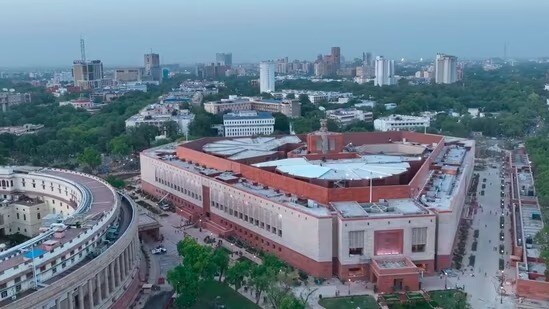In a surprising turn of events, the central government called for a special session of Parliament from September 18 to 22, merely weeks after the conclusion of the Monsoon Session on August 11.
In prior instances, the government has typically called for a special session and convened an all-party meeting to communicate the agenda and foster consensus on the subjects for deliberation. For the first time, the special session will take place in the new Parliament building.
Pralhad Joshi, the Union Minister for Parliamentary Affairs, earlier made a brief statement on ‘X,’ mentioning “important items” on the session’s agenda, with the promise of its imminent circulation.
PM Modi on Monday asserted, “This Parliament session may be small in duration but is big on occasion; it is a session of historic developments.”
What is a special session of Parliament?
While the Constitution doesn’t explicitly define the term ‘special session,’ Article 352 (Proclamation of Emergency) alludes to a “special sitting of the House,” aimed at introducing safeguards when proclaiming an emergency in the nation.
In the pages of Indian Parliamentary history, special sessions hold a unique place, defined by moments of profound reflection and national milestones. These sessions can be categorised into two distinct phases: those marked by earnest debates and the midnight sessions, which have historic significance.
August 14-15, 1997
The first-ever special midnight session of Parliament was summoned on August 14 and 15, 1947, to celebrate India’s independence and mark the transfer of power from British rule.
November 1962
During the 1962 India-China war, Atal Bihari Vajpayee, then Jan Sangh leader, led a delegation that pressed for a special session to discuss the war. Prime Minister Jawaharlal Nehru concurred, convening a session on November 8. Notably, a suggestion to hold the session in secret due to the sensitive nature of the issue was rejected by Nehru, who emphasised that the matters before the House were of “high interest to the whole country.” The Indian parliamentary resolution on China was later passed in the winter session of 1962, pledging to reclaim the occupied territory.
August 14-15, 1972
Special sessions have often been convened to observe important national anniversaries. On August 15, 1972, a special session marked the silver jubilee of India’s independence.
June 1991
In June 1991, a two-day special session (the 158th Session) approved the President’s Rule in Haryana under the proviso to Article 356(3). Rajya Sabha convened on these occasions when Lok Sabha was dissolved.
August 9, 1992
A midnight session commemorated the 50th anniversary of the Quit India Movement, where Mahatma Gandhi’s “do or die” call in 1942 played a pivotal role in ending British colonialism in India.
August 14-15, 1997
Another midnight session marked 50 years of India’s independence, symbolising the nation’s progress since gaining freedom.
July 2008
In the UPA era, a special session of the Lok Sabha was called in July 2008 for a trust vote following the withdrawal of support from the Manmohan Singh government by the Left parties.
November 26-27, 2015
The Indian Parliament came together to pay homage to Dr. B.R. Ambedkar on his 125th birth anniversary, a crucial part of the year-long celebrations dedicated to the architect of the Indian Constitution. The theme revolved around discussing the nation’s unwavering commitment to its foundational document. The Modi government announced that November 26 would be commemorated as Constitution Day.
June 30, 2017
The Modi government organised a joint midnight session of both houses to introduce the Goods and Services Tax (GST), hailed as the most significant indirect tax reform since Independence. However, several major opposition leaders, including former Prime Ministers Manmohan Singh and HD Devegowda, declined to attend, with some opposition parties characterising it as a ‘publicity stunt.’
September 18–22, 2023
September 18–22 is the third such session called by the BJP government since their ruling, whereas it is the tenth special session since Independence. The forthcoming five-day special Parliament session is set to witness the participation of the newly formed Opposition Alliance INDIA. The Opposition has compiled a list of topics they wish to address during the session, including inflation, unemployment, ongoing violence in Manipur, the Adani controversy, communal tensions across India, the need for a caste census (or any census), and the strains on federalism. Senior Congress leader Sonia Gandhi has presented this list to PM Modi, urging him to facilitate discussions on these “matters of public importance.”


